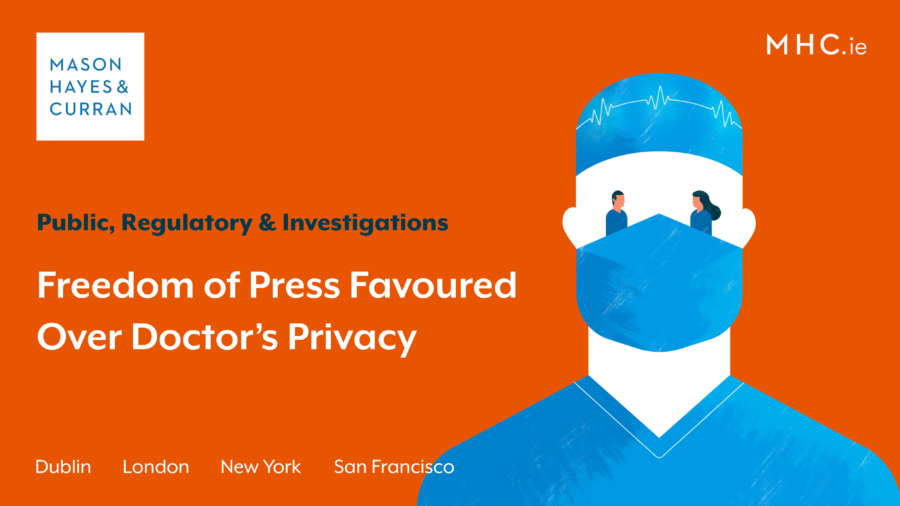
Background
The matter of Medical Council v B[1] originated in a November 2021 application under Section 60 of the Medical Practitioners Act 2007 (Section 60). The application sought to suspend the registration of Dr Syed Waqas Ali Bukhari. Section 60 allows for the making of an application to the High Court by the Medical Council where it “considers that the suspension [of a practitioner’s registration] is necessary to protect the public.” Equivalent provisions exist in legislation governing other professional regulatory regimes. Such applications are made “otherwise than in public”, ie, in private, or with some aspects anonymised, unless the Court considers it appropriate for the matter to be heard in public.
Following the giving of undertakings by Dr Ali Bukhari in December 2021, the High Court was satisfied that his registration did not need to be suspended. However, Dr Ali Bukhari came back before the Court in July 2022 having breached one of the undertakings, by failing to comply with road traffic laws. At this hearing, the Court was ‘just about satisfied by the finest margin possible’ to accept further undertakings. However, it was made clear that this was ‘very much a last chance’ and further non-compliance would give rise to a ‘very real risk’ that Dr Ali Bukhari’s registration would be suspended. Up to this point, Dr Ali Bukhari had benefitted from anonymity.
Mediahuis Ireland Limited (Mediahuis) applied for an order in October 2022 allowing it to name Dr Ali Bukhari. Mediahuis contended that Dr Ali Bukhari’s identity was “a matter of public interest.” This public interest arose, Mediahuis said, where Dr Ali Bukhari was in a “position of significant public responsibility”, but had committed, and been convicted of, several road traffic offences, and had breached undertakings to the Court. Mediahuis noted that the criminal matters were dealt with publicly but that, when Dr Ali Bukhari commented on those and the undertakings to journalists, he did not do so in an entirely honest manner.
In response, Dr Ali Bukhari said that he had been unable to secure employment since July 2022, and that a locum post he obtained in September 2022 was cancelled in light of an article published shortly before his planned start date. Dr Ali Bukhari claimed that, if the High Court matters proceeded in public, and were reported on, whatever limited prospects of employment he had would be ruined.
Procedurally, Dr Ali Bukhari argued that the application by Mediahuis should have been made at an earlier stage when the hearing began. Dr Ali Bukhari also argued that the Section 60 application was already fully heard, and no application could now be made to vary the default position for the remaining matters to be heard in private and for him not to be named.
Balancing the competing rights at stake
In considering the matter, the President of the High Court (President) sought to balance Dr Ali Bukhari’s right to a good name, reputation, and his right to earn a livelihood, with the right to freedom of the press, and the ordinary position that justice should be administered in public.
Dr Ali Bukhari’s argument that Mediahuis’ application was coming too late was dismissed by the Court. The President held that while such an application should ordinarily be heard at the start of a case, this would not always be possible. Here, the matter only came to public attention when a redacted judgment was published in August 2022, and the proceedings were still live. However, the President also reaffirmed that the Court retained a power to direct that a matter should continue at any stage of proceedings, including after the substantive hearing has been held, and judgment delivered.
The Court further rejected Dr Ali Bukhari’s argument that the proceedings should remain in private, because his registration had not suspended. The President indicated that the Court’s discretion to allow a matter to proceed in private or public was a “wide” one, and whether the practitioner was suspended was only a factor to be considered. However, the President also referred the comprehensive undertakings given by Dr Ali Bukhari, and the fact that he had only escaped suspension ‘by the skin of his teeth’.
Decision
The President decided that it was appropriate that any further matters arising under the current Section 60 application should be held in public, with earlier judgments to be amended to name Dr Ali Bukhari. The Court held that, given the nature of the information already in the public domain, hearing the rest of the Section 60 proceedings in public would not have the damaging effect Dr Ali Bukhari argued they would.
The Court held that to continue to hear the Section 60 application in private ‘would be futile [and] ineffective.’ It was noteworthy that Dr Ali Bukhari had previously made ‘misleading’ comments to the media where he stated that he had not been suspended. However, he failed to make any reference to the fact that this was because he had given undertakings to the Court, and that he had only narrowly escaped suspension.
Conclusion
While the application here to revoke privacy was not brought by the regulator, this judgment will be of interest to those involved in interim applications such as those made under Section 60. Section 60 applications, and their equivalents, are not intended to be punitive, but rather have a protective effect for those who may encounter the regulated person.
While interim suspension applications are themselves the primary way in which regulators provide protection for the public, where a registrant does not appear to be complying with such an order, or a lesser form of restriction, it is in the public’s interest that the registrant’s identity be known. Regulators should carefully consider this judgment, particularly in cases where the practitioner has not been suspended, and may be free to practise, albeit with some restrictions.
For more information on this area, contact a member of our Public, Regulatory & Investigations team.
[1] [2021] MCA 318; [2022] IEHC 723
Share this:





